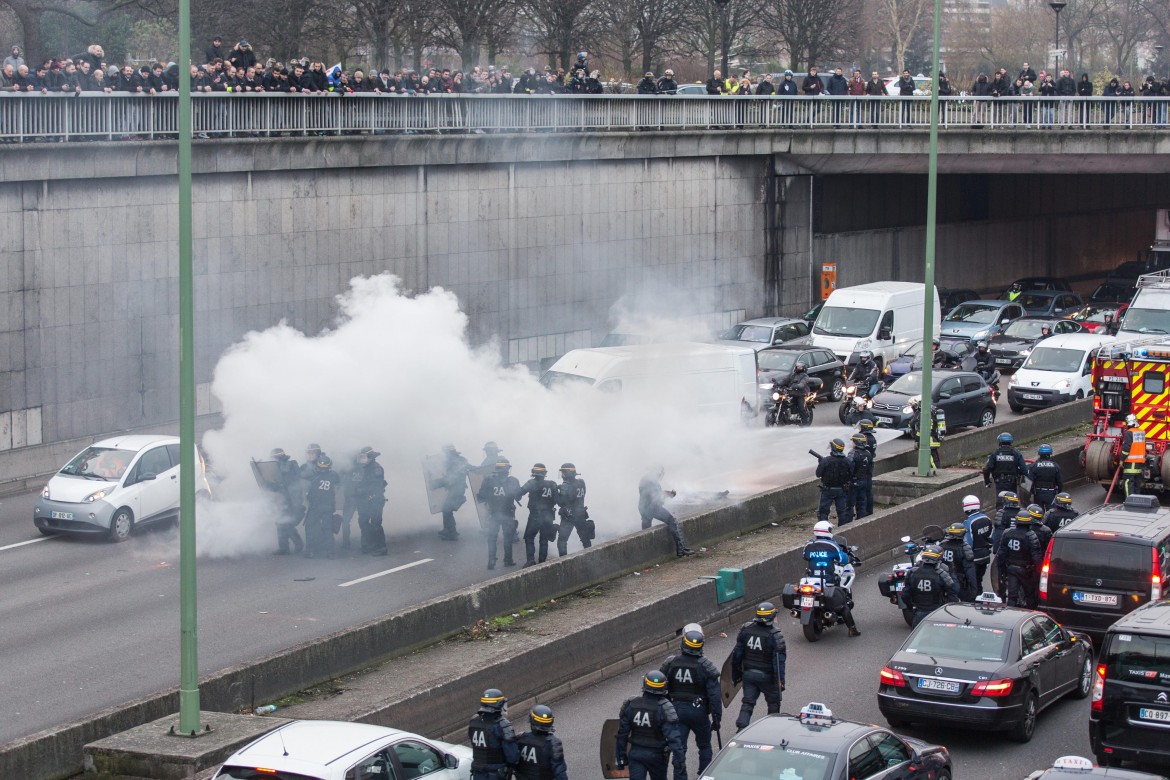France
Revolt against Uberization
The explosion of casual labor is rocking old industries and increasing job insecurity. Taxi drivers from all over Europe demand regulation.

Are they luddites? An old guard refusing to give way to modernity? A war between impoverished workers, threatened by the Uberization of labor?
The battle of taxi drivers against VTCs — the French legal term for “tourism vehicles with driver” — reached epic new levels this week in the country’s major cities. In Paris, there were clashes on Tuesday as police fired tear gas, a protester was wounded in Orly and 20 were arrested. Prime Minister Manuel Valls, who met with a delegation of taxi drivers, has condemned the “unacceptable violence.” Valls, groping for a way out of the conflict, has appointed a mediator.
Paradoxically, the drivers are protesting because they want the government to enforce a law that’s already in place, passed in October 2014 to define the terrain of taxis and VTCs to keep competition fair. It says only taxis are allowed to take customers off the street, while VTCs must be ordered and reserved ahead of time, typically about 15 minutes.
But in this war there’s a third player, which since last year, has caused the cabbies and VTCs to form a momentary alliance against a common enemy: the low-cost UberPop service (known as UberX in the United States). Taxis and VTCs persuaded the government to ban it for unfair competition, and a Paris court fined Uber €150,000. But similar apps are sprouting up like mushrooms, including Heetch and Djump, which was recently absorbed into a VTC company. These apps connect drivers with potential customers who then “contribute to the cost” of the journey, while the company picks up 15 percent.
Taxi drivers from Spain, Belgium and Italy traveled to Paris this week to support the protests. In Strasbourg, the French MEP Dominique Riquet wrote to the European Commission asking for transnational regulation because the phenomenon is spreading everywhere.
Because of the government’s general sympathy to cab companies, the VTCs are accusing taxis of unfair competition. But explain that to a taxi driver forced to obtain a license, undergo professional training, buy compulsory insurance and pay taxes. VTCs respond that the 2014 law requires 250 hours of training. But a taxi license in Paris and Nice costs around €165,000, down compared to 2014 when it was about €220,000. The decline was caused by business lost to VTCs, says Serge Metz of G7, a company that runs 8,000 cabs. He claims 70 percent of VTCs operate outside the law.
“Macronization + Uberization = Casualization” was the main slogan of Tuesday’s protests, referring to the economic shift toward a casual workforce. The taxi drivers’ main enemy, other than Uber, is Economy Minister Emmanuel Macron, whose catch-all law that bears his name is dedicated to liberalizing the French economy in all directions. For Macron, opening up public transportation means increasing employment. The VTC company Chauffeur-Privé claims the industry has created 15,000 jobs in two years in France, all of whom are “self-employed.” Uber France responded to the angry taxi drivers by telling them to take advantage of the “VTC boom” and sign up themselves.
Taxis are asking for the state to compensate them for the cost of the licenses. But Uber founder Travis Kalanick responded from Davos that car manufacturers didn’t have to pay for the death of the horse industry. Then there’s the issue of undocumented immigrants; individuals have been turning in illegal taxi drivers, accusing them of “economic terrorism.” The clash over deregulation is similar to the hotel sector, where Airbnb is subverting rental laws. Valls promised Tuesday to control abuse.
Despite France’s state of emergency, the more than 100 demonstrations were allowed. Taxi drivers weren’t the only ones in the streets. Teachers walked out of schools, and civil servants went on strike demanding wage increases frozen since July 2010. Air traffic controllers are also striking. Ryanair has called on the government to ban their walkout.
Originally published at on
